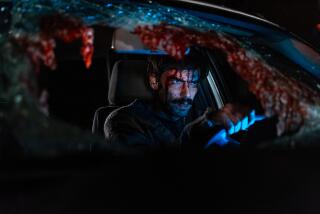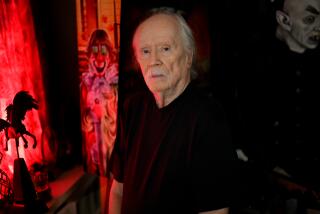‘B-movie’ director raised his game in the 1980s
- Share via
John Carpenter, who has not directed a feature film since “Ghosts of Mars” in 2001, seems to recede further into the margins of American pop culture with each passing year. Even in the more productive phases of his career, he was damned with faint praise, as a B-movie or horror specialist who never matched the promise of his breakthrough film, the slasher landmark “Halloween.”
This was not lost on Carpenter, who supposedly once observed that while he’s considered an auteur in Europe, “in the U.S., I’m a bum.”
This month sees the Blu-ray release of the director’s “Starman” (Sony Pictures Home Entertainment, $28.95) and “Big Trouble in Little China” (20th Century Fox Home Entertainment, $29.99). These two ‘80s films reinforce the sense of Carpenter as a kind of shadow Steven Spielberg, a deft, sometimes ingenious commercial craftsman who recognized the unpretentious pleasures as well as the subversive potential of genre entertainment but was inevitably eclipsed by that decade’s dominant American filmmaker.
Carpenter’s “The Thing” (1982), a remake of Howard Hawks’ Cold War allegory “The Thing From Another World,” opened within weeks of Spielberg’s much cuddlier and vastly more popular “E.T.” “Starman” is a transparent stab at atonement, a friendly-alien weepie to file alongside “E.T.” and “Close Encounters of the Third Kind.”
In response to the invitation of the Voyager space probe, an extraterrestrial being lands in the Midwest, where it assumes human form as a young widow’s recently dead husband. After a superbly tense opening sequence, in which Karen Allen’s terrified heroine watches her visitor grow from infancy into Jeff Bridges in a matter of seconds, the film settles into the familiar rhythms of a romantic road movie.
The Starman has to meet his mother ship in Arizona -- he will die if he remains on Earth -- and the cross-country odyssey occasions much fish-out-of-water comedy and many lessons about humanity. (As always, the point of intergalactic anthropology is to allow humans a chance to see themselves anew.) For the grieving widow, the Starman represents an opportunity for closure: reunited with an exact replica of her spouse, she can say a proper goodbye and even bear his child. It’s largely thanks to the skill and conviction of the actors that the movie, despite such questionable plot turns, never turns completely mawkish.
Carpenter’s direction, at once spare and poetic, also cuts through the phony New Age-isms.
If “Starman,” which earned rave reviews and a well-deserved Oscar nomination for Bridges, is perhaps Carpenter’s most overrated film, “Big Trouble in Little China” is probably his most underrated. “Big Trouble” also appears to take its cue from a Spielberg success -- in this case, the retro adventure-serial feel of the Indiana Jones series.
A buddy movie liberally juiced with kung-fu high jinks and ghost-story sorcery, this is one of four features Carpenter made with his unlikely muse, Kurt Russell (they also worked together on the 1979 TV biopic “Elvis”). Unlike Snake Plissken, the smirking, eye-patched tough guy Russell played in Carpenter’s “Escape From New York” and “Escape From L.A.,” “Big Trouble’s” Jack Burton is a self-parodic buffoon, not good for much besides wisecracking asides as he bungles his way through San Francisco’s Chinatown.
In fact, the film cannily inverts the traditional dynamic between hero and nonwhite sidekick, which helps offset the over-the-top Fu Manchu cliches. Jack is just along for the ride in this madcap caper. Most of the fighting is left to his pal Wang Chi (Dennis Dun), whose fiancee, fresh off a plane from China, has been kidnapped and delivered to an ancient wizard (James Hong), who rules Chinatown’s underground temples and torture chambers.
With its mulleted hero, synthesizer score and cheesy lightning-bolt effects, “Big Trouble” is an unmistakable ‘80s artifact. But in its bold, goofy approach to genre pastiche, it was also ahead of its time, introducing martial-arts choreography to Hollywood long before “The Matrix” and repurposing fanboy exotica for mainstream consumption long before Quentin Tarantino.
A critical and commercial failure, “Big Trouble in Little China” sparked Carpenter’s fall from the A-list. But it might have sealed his fate as one of the greatest cult filmmakers of all time.
--
More to Read
Only good movies
Get the Indie Focus newsletter, Mark Olsen's weekly guide to the world of cinema.
You may occasionally receive promotional content from the Los Angeles Times.










